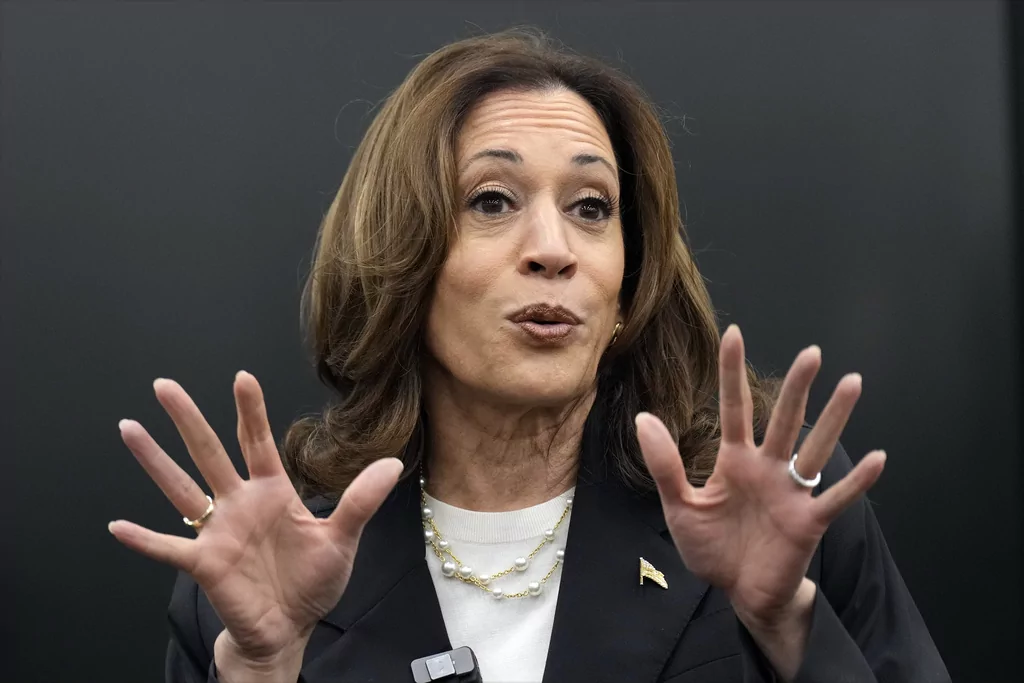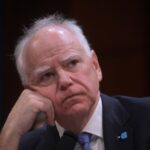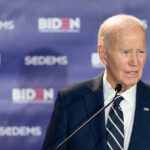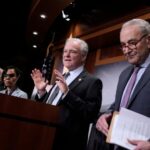

In particular, critics who have scrutinized Harris for her light-on-substance campaign may have more questions than answers as the vice president comes under pressure to detail her policy positions, including on what issues she differs from President Joe Biden and those on which she will strike out on her own.
But, in the interview, Harris defended standing behind Biden amid concerns about his age and mental acuity, in addition to dismissing the idea of an arms embargo to Israel amid its war with Hamas in Gaza.
Here are six takeaways from her sit down with CNN, alongside Democratic vice presidential nominee Gov. Tim Walz (D-MN), in Kim’s Cafe in Savannah, Georgia on Thursday during their bus tour of the Peach State, 68 days before the November election.
Harris’s day one priorities
Harris promised that her day one priority would be helping the middle class, defending Biden’s economic policies, known as Bidenomics. That priority indicates the vice president and her campaign are cognizant that the economy may decide the election.
“First and foremost, one of my highest priorities, is to do what we can to support and strengthen the middle class,” Harris said. “Day one, it’s going to be about implementing my plan for what I call an opportunity economy. I’ve already laid out a number of proposals in that regard, which include what we’re going to do to bring down the cost of everyday goods, what we’re going to do to invest in America’s small businesses.”
Harris also pointed to expanding the child tax credit to $6,000 for families for the first year of their child’s life and a tax credit of $25,000 for first-time homebuyers.
When asked why she has not introduced any of those policies as vice president, Harris contended she and Biden had to lead the post-pandemic economic recovery.
“We have done that,” Harris said. “I’m very proud of the work that we have done that has brought inflation down to less than 3%, the work that we have done to cap the cost of insulin at $35 a month for seniors.
Additionally citing manufacturing jobs, Harris added, “there’s more to do, but that’s good work.”
Policy flip-flops
In a clip circulated before the interview aired in its entirety, Harris underscored that her “values have not changed,” despite many of her policy positions changing.
Harris was specifically pressed on her fracking position, a divisive issue in Pennsylvania, and whether illegal border crossings should be decriminalized.
“No,” Harris said when asked whether she still supported a ban on fracking. “I made that clear on the debate stage in 2020, that I would not ban fracking. As vice president, I did not ban fracking. As president, I will not ban fracking.”
When pushed on what caused her policy position shift, Harris emphasized that “we can grow and we can increase a thriving, clean energy economy without banning fracking.”
On the border, Harris repeated that the country has laws “that have to be followed and enforced that address and deal with people who cross our border illegally,” reiterating that there was a need for “consequences.”
“Let’s be clear, in this race, I’m the only person who has prosecuted transnational criminal organizations who traffic guns, drugs, and human beings,” she said. “I’m the only person in this race who actually served a border state as attorney general to enforce our laws and I would enforce our laws as president going forward. I recognize the problem.”
The interview underscored the pressure Harris could face from her left
Harris’s response to being asked about her previous support of the Green New Deal is an example of a policy position that could create problems with her with more liberal Democrats needs this November.
“You mentioned the Green New Deal,” Harris said. “I have always believed – and I have worked on it – that the climate crisis is real, that it is an urgent matter to which we should apply metrics that include holding ourselves to deadlines around time.”
“We have set goals for the United States of America and by extension, the globe, around when we should meet certain standards for reduction of greenhouse gas emissions,” she added. “That value has not changed.”
The Sunrise Movement, a youth-run organization advocating for measures to counter climate change, has already reacted to Harris’s Green New Deal answer. The Sunrise Movement has declined to endorse Harris, though it will conduct outreach to 1.5 million people on her behalf.
“We have just [six] years left to prevent catastrophic climate change,” the group wrote on social media. “That’s why we’re urging VP Harris to put forward and fight for a bold plan that acts on that timeline.”
… And the pressure she may face regarding the Israel-Gaza war
The forthcoming first anniversary of the Israel-Hamas war coinciding with the return of students to college campuses across the country may also exacerbate Democratic divisions before the fall.
But Harris remained adamant that there would be no policy change regarding an arms embargo to Israel, a position more liberal Democrats have implored her to adopt.
“No,” Harris said when asked about an embargo. “We have to get a deal done… When you look at the significance of this to the families, to the people who are living in that region, a deal is not only the right thing to do to end this war, but will unlock so much of what must happen next.”
“I remain committed, since I’ve been on Oct. 8, to what we must do to work toward a two-state solution, where Israel is secure and, in equal measure, the Palestinians have security, and self-determination, and dignity,” she added.
Last week’s Democratic National Convention in Chicago demonstrated the same political dynamic, especially after the Democratic National Committee did not have a Palestinian-American address the convention. But Harris’s reference to the war during her own speech was praised.
“I will always ensure Israel has the ability to defend itself because the people of Israel must never again face the horror that a terrorist organization called Hamas caused on Oct. 7, including unspeakable sexual violence and the massacre of young people at a music festival,” she said at the time. “At the same time, what has happened in Gaza over the past 10 months is devastating. So many innocent lives lost. Desperate, hungry people fleeing for safety, over and over again. The scale of suffering is heartbreaking.”
Harris defends supporting Biden
Harris defended her defense of Biden after his June debate against former President Donald Trump that precipitated the end of Biden’s reelection campaign.
“No, not at all,” Harris said when asked if she had any regrets regarding what she told the public about Biden after the debate.
Instead, Harris described Biden as caring “so deeply about the American people,” calling him “so smart and loyal.”
“I have spent hours upon hours with him, be it in the Oval Office or the Situation Room,” she said. “He has the intelligence, the commitment, and the judgment, and the disposition that I think the American people rightly deserve in their president. By contrast, the former president has none of that.”
Harris recounted July 21, the day Biden announced he was suspending his campaign and endorsing her as his replacement as the Democratic nominee. The vice president said she was having breakfast with her family, including her grandnieces.
“My first thought was not about me, to be honest with you,” Harris said. “My first thought was about him, to be honest.”
“I think history is going to show, not only has Joe Biden led an administration that has achieved those extraordinary successes, but the character of the man is one that he has been in his life and career, including as a president, quite selfless and puts the American people first,” she added.
Biden was reportedly upset at former President Barack Obama and one-time House Speaker Nancy Pelosi for the roles they played in him standing aside. But he downplayed the speculation during his convention address, insisting “all this talk about how I’m angry at all those people who said I should step down, it’s not true.”
Harris and Walz share interview time, with running mate pressed on controversies
Harris and Walz doing a joint interview for Harris’s first sit-down since becoming the Democratic nominee drew sharp criticism, as Republicans have scrutinized Harris’s media absence.
But the joint interview showcased how they are continuing to learn about one another, as they did not have a deep personal relationship before the vice president tapped the Minnesota governor for the same position she has under Biden.
Critics also feared that Walz could have assisted or deflected if Harris had been asked a difficult question but he, too, was interrogated on his own inconsistencies regarding his military service as a member of the National Guard and his family’s experience with IVF.
“I certainly own my mistakes when I make them,” he said. “I think people know who I am. They know that record… I’ve been out there, and I won’t apologize for speaking passionately, whether it’s guns in schools or protecting reproductive rights. The contrast could not be more clear between what we’re running against, the vice president and I.”






